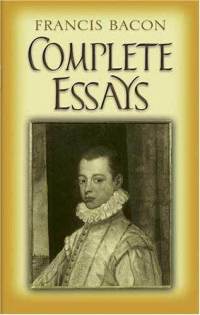 Original Publication Date: 1597
Original Publication Date: 1597Genre: non-fiction, essay
Topics: learning
Review by Liz Inskip-Paulk (http://ravingreader.wordpress.com/):
One in a long series of very short essays (is there a name for a short essay like “novella” for novel?) Francis Bacon was a politician during the sixteenth century in England, and although he himself was not above scandal, he did have some good points about being a good person/leading a good life in his numerous essays.
This particular short essay discusses studies and learning: who should do it, how they should do it, and what they should do with the end results. It’s all very down-to-earth and pragmatic about it, and there is a lot which I agree with and that just makes sense. It’s not the easiest essay to read, but it is packed with points with which I just nodded my head and said “yup” to. I’m not sure why he wrote this huge series of short essays – they were initially packaged into a series of ten and published in 1597, but then revised about ten years later.
He was also a strong writer, and although doesn’t seem to have a big fan of paragraphs (!), he did make good use of parallel sentence construction to emphasize a point (see below). I had seem some of these sayings referred to before reading this, but didn’t know it was Bacon who was the author. He seems to have been enamored of reading as much as I am…
- STUDIES serve for delight, for ornament, and for ability. Their chief use for delight is in privateness and retiring; for ornament, is in discourse; and for ability, is in the judgment and disposition of business.
- To spend too much time in studies is sloth; to use them too much for ornament, is affectation; to make judgment wholly by their rules, is the humor of a scholar.
- Some books are to be tasted, others to be swallowed, and some few to be chewed and digested; that is, some books are to be read only in parts; others to be read, but not curiously; and some few to be read wholly, and with diligence and attention.
- Reading maketh a full man; conference a ready man; and writing an exact man.
Just a delight to read (and I don’t say that very often about sixteenth century writing!)
Download "Of Studies" by Francis Bacon at Project Gutenberg|